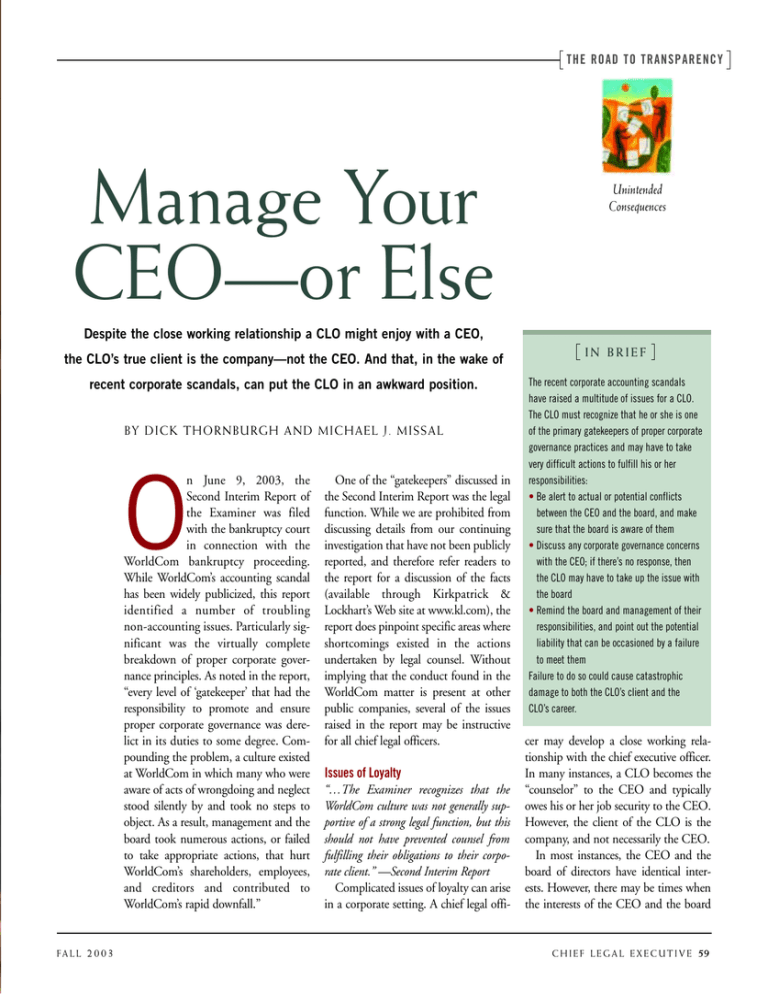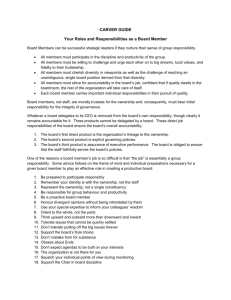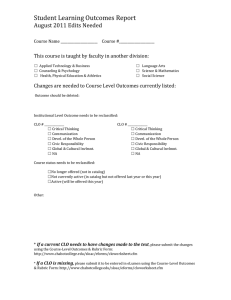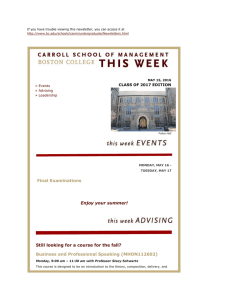
THE ROAD TO TRANSPARENCY
Manage Your
CEO—or Else
Unintended
Consequences
Despite the close working relationship a CLO might enjoy with a CEO,
the CLO’s true client is the company—not the CEO. And that, in the wake of
recent corporate scandals, can put the CLO in an awkward position.
BY DICK THORNBURGH AND MICHAEL J. MISSAL
n June 9, 2003, the
Second Interim Report of
the Examiner was filed
with the bankruptcy court
in connection with the
WorldCom bankruptcy proceeding.
While WorldCom’s accounting scandal
has been widely publicized, this report
identified a number of troubling
non-accounting issues. Particularly significant was the virtually complete
breakdown of proper corporate governance principles. As noted in the report,
“every level of ‘gatekeeper’ that had the
responsibility to promote and ensure
proper corporate governance was derelict in its duties to some degree. Compounding the problem, a culture existed
at WorldCom in which many who were
aware of acts of wrongdoing and neglect
stood silently by and took no steps to
object. As a result, management and the
board took numerous actions, or failed
to take appropriate actions, that hurt
WorldCom’s shareholders, employees,
and creditors and contributed to
WorldCom’s rapid downfall.”
O
FA L L 2 0 0 3
One of the “gatekeepers” discussed in
the Second Interim Report was the legal
function. While we are prohibited from
discussing details from our continuing
investigation that have not been publicly
reported, and therefore refer readers to
the report for a discussion of the facts
(available through Kirkpatrick &
Lockhart’s Web site at www.kl.com), the
report does pinpoint specific areas where
shortcomings existed in the actions
undertaken by legal counsel. Without
implying that the conduct found in the
WorldCom matter is present at other
public companies, several of the issues
raised in the report may be instructive
for all chief legal officers.
Issues of Loyalty
“…The Examiner recognizes that the
WorldCom culture was not generally supportive of a strong legal function, but this
should not have prevented counsel from
fulfilling their obligations to their corporate client.” —Second Interim Report
Complicated issues of loyalty can arise
in a corporate setting. A chief legal offi-
IN BRIEF
The recent corporate accounting scandals
have raised a multitude of issues for a CLO.
The CLO must recognize that he or she is one
of the primary gatekeepers of proper corporate
governance practices and may have to take
very difficult actions to fulfill his or her
responsibilities:
• Be alert to actual or potential conflicts
between the CEO and the board, and make
sure that the board is aware of them
• Discuss any corporate governance concerns
with the CEO; if there’s no response, then
the CLO may have to take up the issue with
the board
• Remind the board and management of their
responsibilities, and point out the potential
liability that can be occasioned by a failure
to meet them
Failure to do so could cause catastrophic
damage to both the CLO’s client and the
CLO’s career.
cer may develop a close working relationship with the chief executive officer.
In many instances, a CLO becomes the
“counselor” to the CEO and typically
owes his or her job security to the CEO.
However, the client of the CLO is the
company, and not necessarily the CEO.
In most instances, the CEO and the
board of directors have identical interests. However, there may be times when
the interests of the CEO and the board
C H I E F L E G A L E X E C U T I V E 59
Thornburgh: A dominating
CEO presents unique and difficult
DONNA TEREK
challenges for the CLO.
THE ROAD TO TRANSPARENCY | Unintended Consequences
are not entirely consistent. For
example, the CEO may be
focused on a short-term solution
to an issue, while the board is
interested in taking a longer-term
view. At other times, the CEO
and the board of directors may
have different visions for the
future of the company and thus
may approach issues with distinct
perspectives. In these situations, a
CLO may have great difficulty
advising both the CEO and the
board. Given the CLO’s loyalty
to the CEO, the board may not
get the independent attention
and counseling it deserves.
The CLO needs to be alert to
actual or potential conflicts
between the CEO and the board,
and to make sure that the board
is aware of those actual or potential conflicts. Assuming that such
a situation exists, and assuming
that the CLO desires to continue
to counsel the CEO, it may be
advisable for the board to consult
with its own independent counsel. True, there may be reluctance
to retaining separate counsel for
the board for fear of creating an
adversarial relationship between
the CEO and the board. However, this concern can be minimized by the selection of counsel
who understands the dynamics
of the situation, without limiting
his or her ethical responsibilities
to the board.
Dealing With a Dominating CEO
“All told, the Examiner believes
that WorldCom’s conferral of practically unlimited discretion upon
…[CEO Bernard] Ebbers and
[CFO Scott] Sullivan, combined
with passive acceptance of
Management’s proposals by the
Board of Directors, and a culture
that diminished the importance of
60 C H I E F L E G A L E X E C U T I V E
internal checks, forward-looking
planning and meaningful debate
or analysis formed the basis for
the Company’s descent into bankruptcy.” —Second Interim Report
A number of the companies
that have been involved in some
of the higher-profile accounting
frauds have had CEOs who
dominated the board of directors
and the other senior management. Some of the problems
associated with these companies
can be attributed to the CEOs
not adequately informing the
board on certain issues or initiatives or not seeking the advice of
that requires immediate action
and that there is not adequate
time for the board and/or senior
management to conduct the necessary due diligence and review.
The CLO will obviously be
put in an uncomfortable situation if he or she believes that an
action of the CEO is not consistent with proper corporate governance practices. The CLO
should discuss any corporate
governance concerns with the
CEO and attempt to convince
the CEO about what steps need
to be taken to meet the corporate
governance obligations. If this
Corporate governance practices can be threatened
when the CEO believes that there is a corporate opportunity
that requires immediate action and that there is not adequate
time for the board to conduct the necessary due diligence.
the CLO or other counsel. This
is not to say or imply that every
dominating CEO is engaged in
wrongdoing or that every company that has problems has a
strong CEO. In fact, many of the
most successful and ethical companies are led by powerful CEOs
who forcefully pursue their ideas
and strategies.
A dominating CEO presents
unique and difficult challenges
for the CLO. Among other measures, the CLO must ensure that
the desired actions of the CEO
do not intentionally or inadvertently violate proper corporate
governance practices. One situation where corporate governance
practices can be threatened is
when the CEO believes that
there is a corporate opportunity
attempt is unsuccessful, one
option would be for the CLO to
inform the CEO that it will be
necessary for the CLO to advise
the board of his or her concerns.
If the CEO continues to refuse to
follow what the CLO believes are
appropriate corporate governance obligations, then the CLO
has no choice but to inform the
board. Given the potential conflict that the CLO may have
between the interests of the CEO
and the board, the board may
want to consult with its own
counsel on this issue.
Fiduciary Obligation
to the Shareholders
“The Examiner believes that in
most corporate contexts, counsel
would have responsibility for advis-
ing the Board and Management
on the proper corporate governance
practices.…At WorldCom, however, no counsel appears to have
seen that as his responsibility.”
—Second Interim Report
One of the identified shortcomings in the WorldCom situation was what we identified as a
“culture of greed.” Necessarily, a
management focused upon, or
directors oblivious to, efforts to
personally enrich key personnel
without a sense of proportionality or scale is defaulting on fiduciary obligations to conduct the
company’s business for the benefit of its shareholders.
The CLO must, in such
cases, assume the responsibility
of reminding the board and
management of its responsibilities and point out the potential
liability that can be occasioned
by a failure to meet them.
Once again, this often puts the
CLO in a delicate position, but
he or she is not advising on policy, but on the law—the law
that seeks to ensure that the
board and management observe
the fiduciary responsibilities
imposed upon them. •
Dick Thornburgh, former U.S.
attorney general and two-term
Pennsylvania governor, is currently counsel in Kirkpatrick &
Lockhart LLP’s Washington, D.C.,
office. He was appointed examiner of the WorldCom bankruptcy
case in August 2002. E-mail
him at dthornburgh@kl.com.
Michael J. Missal, a partner in
Kirkpatrick & Lockhart’s
Washington, D.C., office, has
been serving as counsel to the
examiner in the WorldCom
bankruptcy case. E-mail him
at mmissal@kl.com.
CHIEFLEGALEXECUTIVE.COM
®
Kirkpatrick & Lockhart LLP
Challenge us.®
www.kl.com
BOSTON
n
DALLAS
n
HARRISBURG
LOS ANGELES
n
n
MIAMI
n
NEWARK
n
NEW YORK
n
PITTSBURGH
n
SAN FRANCISCO
n
WASHINGTON
....................................................................................................................................................
This publication/newsletter is for informational purposes and does not contain or convey legal advice. The information herein
should not be used or relied upon in regard to any particular facts or circumstances without first consulting a lawyer.
© 2003 KIRKPATRICK & LOCKHART LLP.
ALL RIGHTS RESERVED.



